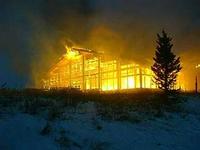-
U.S. Navy probes exam cheating at school for nuclear power reactor operator
Yet another military service is facing allegations of exam-cheating. Earlier this year, the U.S. Air Force launched a probe into a cheating scandal involving about 100 officersat Malmstrom Air Force Base, Montana, who are responsible for maintaining and operating land-based nuclear missiles. Now the U.S. Navy is investigating about one-fifth of its trainers at the school for naval nuclear power reactor operators in Charleston, South Carolina. The sailors are accused of cheating on written tests required to obtain certification as instructors at the nuclear propulsion school.
-
-
Nuclear physicists prove a Peggy Guggenheim Collection painting is a fake
For more than forty years now, art experts and researchers have been trying to determine whether a painting in the Peggy Guggenheim Collection in Venice was a genuine painting which the French artist Fernand Leger produced between 1913 and 1914 as part of his “Contraste de Formes” series. Scientists from the Instituto Nazionale di Fisica Nucleare (INFN) in Florence have used, for the first time in the art world, a brand new carbon 14 dating method — the so-called “bomb peak” curve, which measures the presence of C-14 in the atmosphere — to establish that the canvas used in the painting was produced in 1959, and thus could not have been used by Leger, who died in 1955.
-
-
Snowden’ leaks derailed important cybersecurity initiatives
Edward Snowden’s leaks created such a climate of distrust around the NSA that many important cybersecurity initiatives died, stalled, or became non-starters. Security experts say that this is a case of throwing the baby out with the bathwater, and that the result of these stalled cybersecurity initiatives is that the United States is now more vulnerable to cyberattacks on its infrastructure, and government agencies and American corporations more exposed to sensitive information being compromised and stolen. U.S. officials have found it more difficult to respond to cyberattacks from Russia, China, and elsewhere. “All the things [the NSA] wanted to do are now radioactive, even though they were good ideas,” says James Lewis, a cybersecurity expert at the Center for Strategic and International Studies(CSIS).
-
-
Growing body of evidence connects lead’s deleterious effects to criminal behavior
Violent crimes had reached an all-time high in the United States in the early 1990s, but by the end of the decade, the homicide rate had plummeted by more than 40 percent. Many theories were offered to explain this dramatic decline, but a new explanation is gaining credence: the banning of lead from gasoline and paint in the early 1970s. Babies born post-ban were exposed to far less lead – with its proven contribution to lowering IQ and causing attention problems and antisocial tendencies — and twenty years on, these babies became young adults who committed fewer crimes than their predecessors.
-
-
New research on ocean conditions to aid Navy planners

The Office of Naval Research Global (ONR Global) announced last week a grant to the University of Melbourne which will provide new insights into ocean conditions — crucial information for Navy planners involved in tactical and strategic decision-making. The goal of the effort is to provide the best information possible on the environmental, or battlefield, conditions, so that tactical and strategic decisions can be properly made.
-
-
Chemical, defense companies subject to Chinese Nitro attacks
More and more chemical and defense companies around the world are victims of Nitro attacks. These attacks, launched by government-backed Chinese hackers, install PoisonIvy, a Remote Access Tool (RAT) stealthily placed on computer systems to steal information. The majority of the computers infected belong to firms in the United States, Bangladesh, and the United Kingdom.
-
-
Smartphones to help find avalanche victims
Not a winter goes by without an avalanche incident. In the search for those buried beneath the snow, every second counts. On average, rescuers have fifteen minutes to recover victims alive. This is why an avalanche transceiver is an essential piece of kit for anyone spending significant time off-piste. These transceivers do not come cheap, however, ranging in price from 200 and over 500 euros — perhaps one reason why many walkers and skiers still do not carry one with them. Now smartphones equipped with functions of an avalanche transceiver should help locate the victims quickly.
-
-
Arizona lawmaker pushes measure to limit NSA operations in the state
Arizona State Senator Kelli Ward, a tea party Republican representing the Lake Havasu area, is pushing a bill in the State Senate which would impose limits on the ability of the NSA to operate in Arizona. In December Ward became the first legislator in the nation to declare she would introduce legislation to limit NSA activities in the state, and so far legislators in twelve other states have introduced similar bills. Arizona SB 1156 would. Among other things, prohibit local and state law enforcement officials from cooperating with the NSA and would prevent state or local prosecutors from using NSA-collected information which had not been obtained with a warrant. The bill would also withhold funds from state universities and colleges supporting the NSA with research or recruitment. Legal scholars say the courts would in all likelihood strike down Ward’s measure because Arizona, in essence, is trying to regulate the federal government.
-
-
National Guard units help states ward off cyberattacks
Governors across the United States are mobilizing their states’ National Guard units to combat threats from cyberattacks. The state of Washington was the first state to assign the state’s National Guard cybersecurity responsibilities. The state recognized the potential of its National Guard as a cyberforce when it realized that many of its soldiers, who are full-time employees and part-time soldiers, worked for tech employers such as Google, Boeing, Cisco, Verizon, and Microsoft.
-
-
Eco-terrorist sentenced to five years and ordered to read Malcolm Gladwell’s book

Last Monday, Chief U.S. District Judge Ann Aiken imposed a 5-year sentence on radical environmental activist Rebecca Rubin for her involvement in several acts of arson, including the burning of Vail Colorado’s Twin Elks Lodge which caused millions of dollars in damage. Rubin spent almost eight years living underground, giving herself up to the FBI last October. She pleaded guilty to arson, attempted arson, and conspiracy to commit arson in connection with a radical environmental group calling itself The Family. Judge Aiken also ordered Rubin to read Malcolm Gladwell’s 2013 book David and Goliath, explaining that Rubin might learn a thing or two about non-violent environmental advocacy while serving her sentence.
-
-
Barrier technology strengthens protection at Navy ports
Advanced technology rules the day in modern warfare — yet one very real threat to the U.S. Navy comes from a simple but deadly enemy strategy: small speed boats laden with explosives ramming into ships in harbor. Now a new maritime security barrier, developed with support from the Office of Naval Research (ONR), could provide a quantum leap in existing sea-port protection.
-
-
Quantum encryption for wiretap-proof communication a step closer

Polarized light, in which all the light waves oscillate on the same plane, forms the foundation for technology such as LCD displays in computers and TV sets, and advanced quantum encryption. There are two ways to create polarized light, but each has its problems: filtering normal unpolarized to block unwanted light waves (but here, half of the light emitted, and thereby an equal amount of energy, are lost), or using light which is polarized at the source (but here, polarization is either too weak or hard to control). Now there is a better way: By emitting photons from a quantum dot at the top of a micropyramid, researchers are creating a polarized light source with a high degree of linear polarization, on average 84 percent. As the quantum dots can also emit one photon at a time, this is promising technology for quantum encryption, a growing technology for wiretap-proof communication.
-
-
U.S. will seek death penalty for Dzhokhar Tsarnaev
The U.S. Justice Department announced that the United States will seek the death penalty against Dzhokhar Tsarnaev, the 20-year-old accused of detonating two bombs the Boston Marathon last Aril, killing three people and injuring more than 200 others. The younger Tsarnaev faces thirty counts in the bombing, including use of a weapon of mass destruction resulting in death and the bombing of a public place. Since 1964, the federal government has only executed three people, including Timothy McVeigh who was convicted in the 1995 Oklahoma City bombing.
-
-
Chemical, physical traits of post-nuclear detonation fallout identified
Post-detonation nuclear forensics relies on advanced analytical techniques and an understanding of the physio-chemical processes associated with a nuclear detonation to identify the device type and the source of the nuclear material in the device. Researchers have begun to develop a technique that provides a practical approach for looking into the complex physical and chemical processes that occur during fallout formation following a nuclear detonation.
-
-
A first: Constitutionality of NSA warrantless surveillance challenged by terrorism suspect
Jamshid Muhtorov, a refugee from Uzbekistan now facing terrorism charges in Colorado, is the first criminal defendant who, as part of his lawyers’ defense strategy, is challenging the constitutionality of the NSA’s warrantless surveillance program. Muhtorov filed a motion Wednesday in federal court in Denver to suppress any evidence obtained through the agency’s surveillance program on grounds that it was unlawful. In July 2013 the Justice Department reversed an earlier policy, and now informs defendants whether the case against them, in whole or in part, is based on information obtained through warrantless surveillance. To date, six months after the review process at Justice was launched, Muhtorov and Mohamed Mohamud, a Portland, Oregon teenager who had been convicted after an FBI sting operation of attempting to detonate a bomb at a Christmas tree lighting ceremony, are the only defendants to receive such a disclosure.
-
More headlines
The long view
Why Was Pacific Northwest Home to So Many Serial Killers?
Ted Bundy, Gary Ridgway, George Russell, Israel Keyes, and Robert Lee Yates were serial killers who grew up in the Pacific Northwest in the shadow of smelters which spewed plumes of lead, arsenic, and cadmium into the air. As a young man, Charles Manson spent ten years at a nearby prison, where lead has seeped into the soil. The idea of a correlation between early exposure to lead and higher crime rates is not new. Fraser doesn’t explicitly support the lead-crime hypothesis, but in a nimble, haunting narrative, she argues that the connections between an unfettered pollution and violent crime warrant scrutiny.
Bookshelf: Smartphones Shape War in Hyperconnected World
The smartphone is helping to shape the conduct and representation of contemporary war. A new book argues that as an operative device, the smartphone is now “being used as a central weapon of war.”
